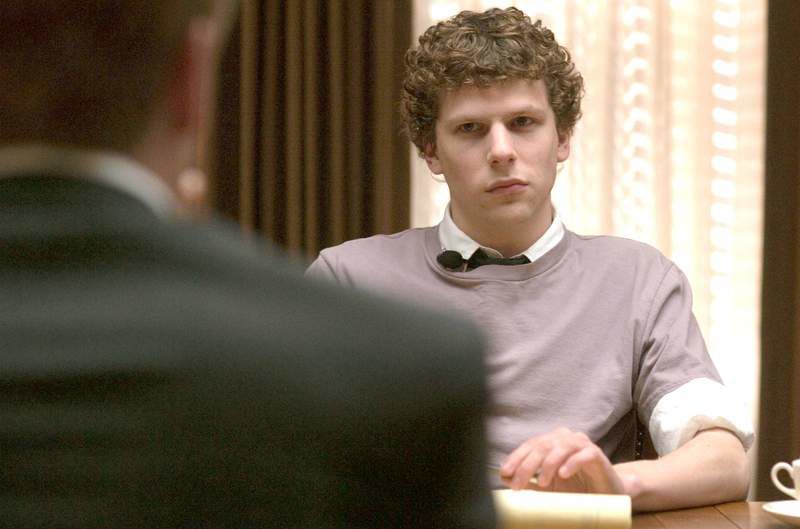Facebook feeling unfriendly toward film, but what to do?
Published 5:00 am Saturday, August 21, 2010

- Jesse Eisenberg portrays Mark Zuckerberg in “The Social Network,” a 2010 film directed by David Fincher. The movie seeks to tell the story of Facebook's rise to prominence, but Zuckerberg and his colleagues bristle at the portrayal.
At the New York Film Festival next month, Hollywood will unleash “The Social Network,” a biting tale of Facebook and its founder Mark Zuckerberg.
Now Facebook must decide whether to bite back.
After fretting for months over how to respond, the company appears to have decided that its best bet is to largely ignore the movie and hope that audiences do the same — that “The Social Network” will be another failed attempt to bottle a generation, like “Less Than Zero,” and not culturally defining, as it aspires to be, in the way of “Wall Street” or “The Big Chill.”
Behind the scenes, however, Zuckerberg and his colleagues have been locked in a tense standoff with the filmmakers, who portray Facebook as founded on a series of betrayals, then fueled by the unappeasable craving of almost everyone for “friends” — the Facebook term for those who connect on its online pages — that they will never really have.
Zuckerberg, at 26 a billionaire, and his associates are wary of damage from a picture whose story begins with the intimacy of a date night at Harvard seven years ago and depicts the birth of a Web phenomenon in his dorm room.
By his account, and that of many others, much in the film is simply not true. It is based on a fictionalized book once described by its publicist not as “reportage” but as “big juicy fun.”
“It’s crazy because all of a sudden Mark becomes this person who created Facebook to get girls or to gain power,” said Chris Hughes, a Facebook co-founder who left in 2007 to join the Obama presidential campaign. “That’s not what was going on. It was a little more boring and quotidian than that.”
‘They do not like it’
Scott Rudin, a producer of “The Social Network,” said two top Facebook executives, Elliot Schrage, the vice president of communications, and Sheryl Sandberg, the chief operating officer, “saw the movie a while ago, and they do not like it.”
Rudin described months of backdoor contacts during which he tried to ease relations with Zuckerberg by letting colleagues of the Facebook chief read the script, and even by accommodating them with small changes. Facebook had insisted on bigger changes, which the producers declined to make. In the end, Rudin said, “We made exactly the movie we wanted to make.”
Zuckerberg declined to be interviewed for this article. In a recent onstage interview, he said, “Honestly, I wish that when people try to do journalism or write stuff about Facebook that they at least try to get it right.” He later added, “The movie is fiction.”
But Rudin said the movie was about conflicting truths, as recalled by Zuckerberg and his associates, largely in a pair of court cases that ended in settlements.
“There is no such thing as the truth,” Rudin said.
In a statement, Facebook acknowledged that “it’s a sign of Facebook’s impact that we’re the subject of a movie — even one that’s fiction.”
“The Social Network,” which is set for release by Sony Pictures on Oct. 1, is being rushed into awards contention by a pair of Hollywood’s most powerful filmmakers, director David Fincher and writer Aaron Sorkin. The two worked without acquiring the rights from Zuckerberg and other subjects, relying instead on journalist Ben Mezrich’s book, “The Accidental Billionaires,” and on the legal protection provided to free speech, along with Rudin’s diplomacy. The book drew heavily on interviews with Eduardo Saverin, a co-founder of Facebook and a former friend of Zuckerberg’s, who later felt that he was unfairly sidelined.
For months, Rudin said, he talked with Schrage and others about a collaboration that would have involved incorporating work from David Kirkpatrick, who was writing a separate book about Facebook. Eventually, it became clear “that we were not going to be working together,” Rudin said, although he maintained contact long enough to screen a nearly finished film for Schrage and Sandberg.
Party scenes
Filmmakers often elect not to buy rights for people who figure only marginally in a picture. That is also the case for television movies that adhere closely to the public record. But studios like to lock down the rights to their principal living subjects, if only so they will not be bound to literal truth in their portrayals.
Rudin said rights were unnecessary in this case, partly because of the extensive legal record.
The movie deals heavily with themes familiar to Hollywood, like friendship and betrayal, but makes little effort to explain Silicon Valley or the Facebook phenomenon. Indeed, much of the story borrows from depositions taken in cases pressed by former associates — Saverin, Divya Narendra and Tyler and Cameron Winklevoss — over the founding and subsequent ownership and control of Facebook.
The film is also sprinkled with scenes of extravagant parties, and it is not clear how authentic they are. As of this week, Rudin said, one remaining question was to what extent the finished film would include a scene that depicted Sean Parker, the Napster co-founder who was heavily involved with Facebook’s early history, delivering his dialogue while a pair of teenage girls offer partygoers lines of cocaine from bared breasts.
Matthew Hiltzik, a spokesman for Parker, declined to comment. But a person who was involved with research for the film, and spoke on condition of anonymity to avoid conflict with the producers, said that sequence was one of several that were mostly made up.
Rudin said his main concern about the scene involved how much could be shown without compromising the movie’s hoped-for PG-13 rating.
As for the portrayal of Zuckerberg, Rudin offers no apologies.
Zuckerberg is “simultaneously a builder and a destroyer,” Rudin said. “It’s a big subject. It’s a big American subject.”






